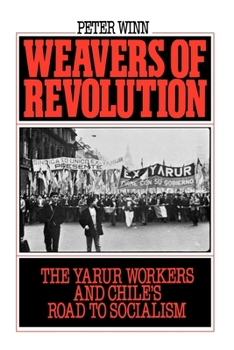Weavers of Revolution: The Yarur Workers and Chile's Road to Socialism
Select Format
Select Condition 
Book Overview
In this compelling narrative history, Peter Winn tells the story of the Chilean revolution as it was seen through the eyes of the participants. Winn focuses on workers at the Yarur plant, Chile's largest cotton mill, who seized control of their factory and began to socialize its operations. Allende's plans were less radical than their own and the workers found themselves on a collision course with the government. Winn, who interviewed both the workers...
Format:Paperback
Language:English
ISBN:0195045580
ISBN13:9780195045581
Release Date:January 1989
Publisher:Oxford University Press
Length:354 Pages
Weight:1.14 lbs.
Dimensions:0.9" x 6.2" x 9.1"
Related Subjects
Australia Australia & Oceania Biography & History Business Business & Finance Business & Investing Chile Communism & Socialism Company Profiles Economics Education & Reference History Language Arts Latin America New Zealand Political Ideologies Political Science Politics & Government Politics & Social Sciences Popular Economics Social Sciences South America TextbooksCustomer Reviews
5 ratings
Good book about revolution from below in Allende's Chile
Published by Thriftbooks.com User , 17 years ago
This book is a great read for anyone who studies Latin America or Chile or simply wants to learn more about Chile under Allende. The book describes the history of the Yarur textile mill from its creation to occupation and eventual return to Yarur family control. Winn gives a descriptive account of the unionizing efforts inside the mill.
Interesting Perspective
Published by Thriftbooks.com User , 18 years ago
Winn is currently a History Professor at Tufts University (added the link to his office below) but at the time he began the research for this book he was completing his doctorate at Cambridge University. It is an interesting read, mostly documented with interviews with workers at the mill themselves. Winn gives good insight into the history of the mill itself and in doing so carefully explains the Chilean political class structure and the generational differences between the less politicized older workers and the more vocal younger workers. His main thesis, is essentially that Allende was to cautious in believing that he could appease the Christian Democratic faction of the Popular Unity coalition and instead should have embraced the calls from his own Socialist Party faction to immediately turn over factories to workers. While one may disagree with his perspective, there is no doubt that this work should be read by people from all political stripes if they want a detailed work into the politics within the PU government and grassroots activism in Chile during the Allende years. [...]
Conflict between a revolution from above and that from below
Published by Thriftbooks.com User , 24 years ago
The seizure of Yarur factory on April 25, 1971 marked the beginning of a tumultuous struggle for socialism in Chile. Salvador Allende, of the popular unity party, ran on a platform that sought to unify the working population. Allende's vow to guide Chile down the democratic road to socialism is one of his greatest legacies. The democratic road to socialism was paved, at least symbolically, with the efforts of the working class. The failures and successes of Allende's travel through la "via Chilena" hinge on whether "the Chilean revolutionary process was of and by the workers or merely for the workers." Allende would die the death of a martyr: machine gun in hand in an enflamed national palace that had been besieged by a hostile coup. If Allende died the death of martyr, to whom was he a hero? Inconsistent with traditional revolutionary ideology Allende feared a rampant revolution. As a self-proclaimed Marxist his views irked both capitalists and the middle class. El presidente compañero, regardless, was a president for the people. His core constituency demanded a revolution from below and thus complicated the revolution from above that Allende attempted to impose. With these conflicts in mind Peter Winn analyzes the extent to which Allende (a socialist) both failed and succeeded as a revolutionary.
The micro politics of revolution
Published by Thriftbooks.com User , 25 years ago
I agree with the last reviewer, except for her\his curious reference to this being a "Trotskyist" view. What I like about this book is the way one can see the dilemnas and perspectives of different actors within the coalition that backed Allende. Less an endorsement of any one tendency's political line, this book brings out the tragedy of various democratic revolutionary factions all trying to do the right thing and unable to unite the face of repression. Best of all, it links the perspectives of ordinary workers with the difficult choices face by leaders.
A tapestry of voices from the trenches of revolution
Published by Thriftbooks.com User , 25 years ago
Winn's book gives a detailed (and Trotskyist) account of a "revolution from below" that transpired during Allende's "revolution from above." It depicts the struggles of textile workers as they grew conscious of their class standing, became unionized and, ultimately, siezed control of the nation's most prominant mill. In the end, however, Winn demonstrates how the Yarur workers and the Popular Unity government imagined different Chilean roads to socialism, and how this divergence brought the social revolution and the Ex-Yarur mill to a tragic conclusion. It is a well-crafted and readible book...a "must" for any student of Latin American history, social revolution or Marxist theory.





